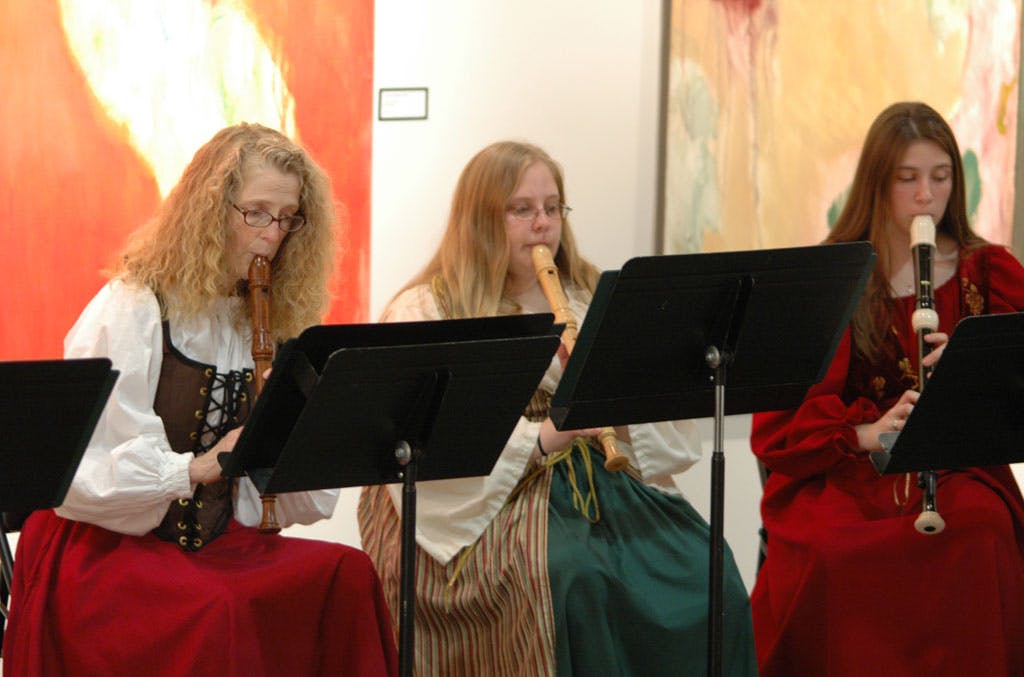Elizabeth Haskins Was Founding Member and Directed for 40 Years
Wilmington College’s early music ensemble, Collegium Musicum, will present its final concert Nov. 29 after 47 years of performing music from the Medieval, Renaissance and early Baroque periods.
PICTURED: Elizabeth Haskins (LEFT) plays the recorder in this 2009 performance by Collegium Musicum, which will have its final performance Nov. 29.
The group’s fall mini-concert, titled “A Festival of Early American Music,” will begin at noon in Harcum Art Gallery in Boyd Cultural Arts Center. A light lunch will be provided.
The event is free of charge, but audience members are encouraged to bring donations of nonperishable food items, cleaning supplies, trash/storage bags, diapers or personal hygiene items in support of Clinton County Services for the Homeless.
The concert will include music by, among others, 18th century composer William Billings, featuring Christmas carols he composed and his most famous pieces, “Chester” and “When Jesus Wept.”
Elizabeth Haskins, emerita assistant professor of music, is the long-time director of Collegium Musicum, which was founded in 1971 by her late husband, Robert J. “Jim” Haskins, emeritus professor of music.
While she retired in 2017, Haskins agreed to continue directing the ensemble, which provided students with instrumental music credit necessary for music minors. The new Quaker Thunder Pep Band now fulfills that instrumental requirement.
Haskins was a student at WC when her future husband started the Collegium Musicum, which was a term used by J.S. Bach meaning “musical colleagues.” She noted that type of music was especially popular in the late 1960s/early ‘70s and he played in such a group in Cincinnati.
“Jim was so excited about the music. He thought the Collegium would be a wonderful way to teach music history at Wilmington College,” she said. “You learn about music in the Medieval, Renaissance and early Baroque periods by playing it — that’s hands-on learning!”
Jim Haskins convinced the family of a WC piano student, Samuel Lingelbach, Class of ’69, from Philadelphia to assist the College in purchasing the expensive instruments needed to perform the unique music. To this day, the five recorders, four krumhorns and four violas da gamba — German instruments related to the oboe, bassoon and bagpipes that were popular from 1450 to 1600 — are known as the Lingelbach Collection of Historic Instruments. The Collegium has also used a Haskins-owned harpsichord for years.
“These instruments were specially built for us,” she added. “At 47 years old, they shouldn’t still work, but they do.”
Jim Haskins directed the group through 1978, when Elizabeth Haskins joined the College as an adjunct faculty member. She took over the Collegium in 1979, beginning her 40-year run. At one point, she added a new iteration of WC’s Madrigal Singers to the ensemble for about 10 years. The Collegium performed for 20 years at Ohio State University’s popular Medieval Festival, in addition to its campus concerts and taking the show on the road to nursing homes, churches and elementary schools.
Also, she recalled then-student Rhonda Weasler making the musicians’ original costumes in the early 1980s, attire that lends an aura of authenticity to their performances.
Throughout the group’s 47-year run, members often played with the group long after the terms in which they received academic credit. Indeed, Lori Scott, Class of 1990, has been a stalwart on the bass krumhorn for years. Also, several musically inclined faculty members joined the ensemble. Dr. Stephen Potthoff, associate professor of religion and philosophy, has been steadfast in his interest. Indeed, Jim Haskins, who died in 2015, played bass viol da gamba for years and Elizabeth Haskins both directs and plays soprano recorder.
“I thought it was a really good thing to have students and faculty make music together,” she said, noting that being part of a group teaches students a sense of commitment while also providing a creative outlet. “The group is about teaching and having people who are interested in living, breathing history.”
For Elizabeth Haskins, Collegium Musicum has always been special. She was a founding member of the ensemble started by her husband, and continuing to direct it even after she retired was very much a tribute to him.
“Collegium is more than just a group to me — it’s Jim,” she said. “I have to think about the concert. I want it to be as good as it can be, so I don’t have the luxury of thinking emotionally about this — until the end.
“I knew I would, sooner or later, have to give it up,” she added. “It’s going to be bittersweet, but the sweet part is there are still people around who want to play and listen to early music.”
